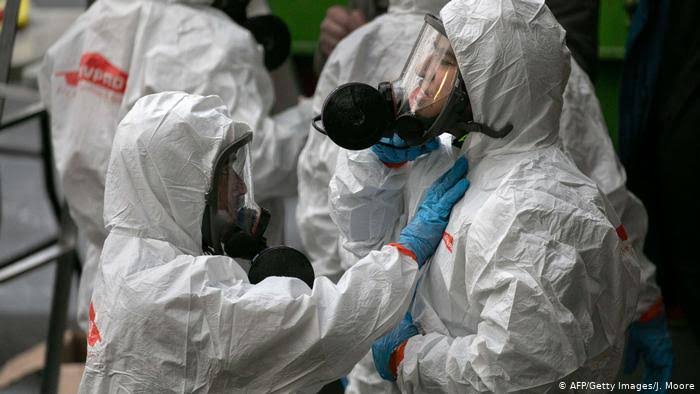The German government will provide support to businesses and communities at all levels in the battle against the coronavirus, Chancellor Angela Merkel said in Berlin on Friday.
SEE ALSO: Trump to announce Economic Measures to Boost Economy amid Virus Fears
“We, the federal government, the individual states, the German parliament, intend to do everything needed, everything that Germany needs, to get through this crisis as well as possible,’’ Merkel said.
She pointed to school closures, pledges of business loans and funding for short-time working as far-reaching measures already announced.
While the current crisis recalls the 2008-09 financial crisis, “we are faced here with an opponent, if I may say so, a virus that we do not know, where we do not know how to fight it,” she said.
She called for Germans to show solidarity, noting that the best way to help those at risk was paradoxically to avoid contact with them.
Earlier, Finance Minister Olaf Scholz announced the provision of unlimited credit to businesses to offset the coronavirus crisis.
The announcement came as the federal and state governments introduced more stringent measures to curb the spread of the coronavirus.
German has seen about 2,400 confirmed cases of the virus, including seven deaths.
The German parliament pushed through measures to give affected employees access to funds intended for short-term work.
Also as authorities in Germany’s 16 states moved to restrict visits to homes for the elderly and shut down schools in a series of patchwork measures spreading across the country.
Economy Minister, Peter Altmaier told Der Spiegel news magazine that the government was retaining the option of taking a stake in key companies, but added that there was no immediate prospect of widespread nationalisation.
The pharmaceutical sector, which draws many of its medications from Asia, could need help, Altmaier said.
Deutsche Bahn (DB), the state-owned German rail company, announced that its regular express service from Frankfurt through south-western Germany and Switzerland to Italy had stopped running, and direct services were no longer available to Italy.
In addition, DB’s services from Bavaria to Italy are now stopping in Austria, while normal services to France are continuing for the present, although passengers are being advised to check ahead of travelling.
On the border with the virus-hit French region of Grand Est, police imposed spot checks for the virus.
Anyone with flu-like symptoms would have their temperature taken, and in the event of a suspected case of illness, turned away at the border after Germany’s official disease control body, the Robert Koch Institute, declared Grand Est a high-risk area on Wednesday, they said.
The Central Council of Muslims in Germany (ZMD) urged mosques to cancel traditional Friday prayer services, with the aim of slowing the progress of the pandemic and easing pressure on the country’s health services.
Friday prayers and other activities in mosques across Germany should be cancelled at least until the end of March, the ZMD said after consultation with health authorities at federal and regional level.
Among the measures put forward by Scholz and Altmaier are billions of euros in financial aid to companies and employees, government sources told dpa.
A delay in tax payments is expected to be part of the package, which is designed to avert cash-flow problems.
In Munich, Bavarian Premier Markus Soeder announced that visits to homes for the elderly would be heavily restricted.
He added that the elderly should not be asked to look after children.
All schools, child day-care centres and creches are to be closed across the southern state, Germany’s largest by area, from Monday up to April 6, and the start of the Easter holiday.
The move effectively shuts down all education in the state up to April 20.
“As there is no medication, we are compelled to take other measures to slow the spread,’’ Soeder said, after at least 500 people had tested positive for the virus by Thursday.
As of Friday, most of Germany’s 16 states announced that schools and creches would be closed from Monday.
The remaining states were holding discussions and were expected to follow suit.
Family Minister Franziska Giffey defended regional decisions on school closures.
“Naturally, health has priority, and wherever there are concrete illness or suspect cases, temporary closures are necessary,’’ she told the Friday edition of the Rhein Neckar Zeitung newspaper.
But she also noted that a total school shutdown would lead to problems with childcare.
“This would affect parents working in hospitals, nursing or doctors’ practices,’’ Giffey said, noting that calling on grandparents to take over would put them at risk.
The Federal Statistical Office (Destatis) puts the total number of schools at around 43,000 with 11 million pupils and some 820,000 teachers.

